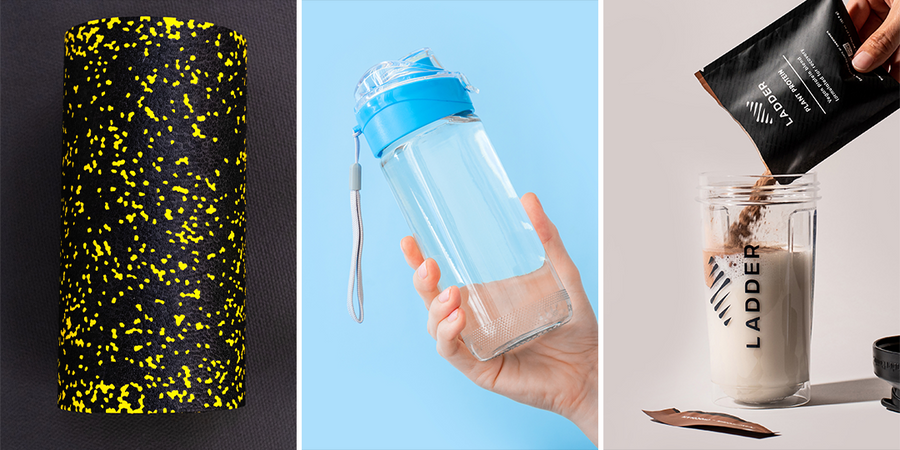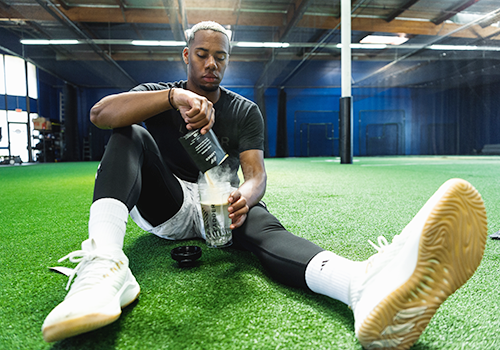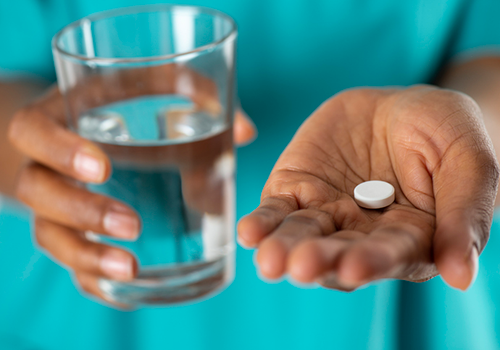
6 Most Effective Ways to Speed Post-Workout Recovery
By Lauren Bedosky
The work doesn't end once your workout is over. This is when your body begins the all-important job of recovery — and the better and faster you can complete this task, the sooner you can cue up your next workout.
Your best options to promote recovery post-workout fall into two categories: soft-tissue work and nutrition.
"The former helps ease tension, boost blood flow, and maintain and improve mobility, and the latter supplies your body with the nutrients it needs to restock fuel stores and adapt to your training," says Trevor Thieme, CSCS, LADDER's senior director of fitness and nutrition content.
So when figuring out how to recover faster from a workout, don't rely on a single recovery method — bounce back faster by combining the following strategies.
Get over 20 grams of high-quality protein, along with muscle-repairing BCAAs in LADDER Whey and Plant Protein!
.
1. Foam Rolling

Rolling out your muscles is a great way to release tightness and muscular tension after a workout. A foam roller allows you to apply deep pressure to different areas, helping stretch and massage your tissues.
This is thought to boost circulation and promote blood flow so oxygen and other helpful nutrients can get to the areas you just worked.
As a result, foam rolling may help increase your range of motion and lower delayed-onset muscle soreness (DOMS).
.
2. Static Stretching
Static stretching — holding a stretch for up to 30 seconds — has a place in any post-workout recovery routine. Research suggests it can improve flexibility and range of motion and ease muscle stiffness and pain.
Spend at least 10 minutes stretching your major muscle groups after your workout. Take the stretch to the point of slight discomfort and hold for 10 to 30 seconds. Repeat until you've accumulated 60 seconds per stretch.
.
3. Protein

Your muscles can't recover without ample protein.
Depending on the intensity of your workout routine, the International Society of Sports Nutrition recommends getting 1.4 to 2 grams of protein per kilogram of body weight per day to maximize muscle recovery.
To find your weight in kilograms, divide your weight in pounds by 2.2. So if you weigh 150 pounds — which equates to 68 kilograms — that would be roughly 95 to 136 grams of protein per day.
A protein supplement is an easy way to make a dent in this daily total. Mix a packet of LADDER Whey Protein or LADDER Plant Protein with water, milk, or your smoothie or shake recipe of choice.
LADDER protein is especially helpful for kick-starting recovery because "it's made to digest quickly to supply your body with the building blocks necessary for repairing the muscle damage caused during your workout," Thieme says.
"The best protein supplements also include other recovery-focused ingredients to help you bounce back faster," Thieme adds. For example, LADDER Whey Protein offers 26 grams of protein along with tart cherry extract, which may help to reduce exercise-induced muscle soreness.
.
4. Sleep
It's never smart to skimp on sleep. Here's one more reason to get your zzz's: Sleep may help your muscles get the nutrients needed for recovery.
Protein is essential for repairing and rebuilding muscles post-workout, and research suggests sleep plays an important role in protein synthesis.
Your muscles also restock glycogen (the storage form of carbs) while you snooze. Your body relies heavily on glycogen for energy during exercise.
To keep your recovery on schedule, be sure to get the recommended 7 to 9 hours of sleep per night.
.
5. Hydration

Water is a key component of our bodies — after all, we're made up of about 50 to 60 percent of it — and proper hydration is essential for the recovery process.
Water helps deliver blood to muscles, brings in oxygen, and flushes waste products that contribute to muscle soreness. So drink up!
There aren't any hard-and-fast rules as far as how much water to drink, but eight glasses a day, or half your body weight in grams, can both be helpful guidelines to follow.
.
6. Light Activity
Remember, your recovery time starts the second the workout ends and continues until your next one begins, Thieme says.
During that in-between time, do gentle activities like yoga, walking, and leisure hiking to optimize your recovery. This keeps your muscles warm and blood flowing, which helps ease soreness and tension.
.
Are There Recovery Methods I Should Avoid?

"It's less a matter of which recovery methods to avoid and more a matter of which ones to focus on because they work best," Thieme says.
Still, you may want to avoid pain relievers if possible. While they may help to soothe sore muscles, research suggests they may slow certain parts of the recovery process. And one small study found that high doses of anti-inflammatory medications may have a negative impact on adaptations to resistance training.
.
How Long Does Muscle Recovery Take?
How long it takes your body to recover depends on how much muscle damage your workout caused and how well you pamper those muscles afterward.
Any activity that's intense or new-to-you may extend your recovery time. Exercises that include an eccentric (lengthening) muscle contraction, like running downhill or lowering into a squat, will also generate more muscle damage.
But don't be put off by the phrase "muscle damage" — it's an essential part of exercise. Muscle damage is "what provides the stimulus for you to become stronger, faster, and fitter," Thieme says.
Muscle damage only becomes an issue when the soreness gets out of control. Generally, DOMS reaches its peak between 24 and 72 hours after exercise, according to the American College of Sports Medicine. If you're still sore beyond that point, you may have pushed a bit too far.
The key to seeing results from exercise is to give your body the tools it needs to recover. Use multiple methods to keep your recovery on track and ensure you don't miss a beat in your workout routine.



